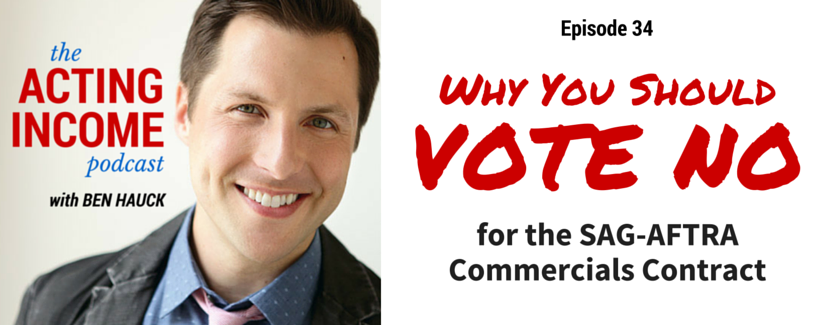Host (and actor) Ben Hauck explains in detail why SAG-AFTRA actors should vote no on the proposed 2016 Commercials Contract.
In the episode, Ben outlines some of the important losses SAG-AFTRA actors will experience should they ratify this contract negotiated recently between the union and commercial producers. Namely, actors will lose use fees they typically get when their commercials are played. They’ll lose these use fees (which could equal hundreds to thousands of dollars) when their commercials are simultaneously streamed on the Internet, New Media, or a future technology, and they’ll also lose them when their commercials are edited for special offers and promotions.
In addition, SAG-AFTRA actors will be paid later than in the prior commercials contract. Furthermore, the proposed contract does not include a precise definition for the term “commercial,” which means that a later definition may prompt the union to give away more of your use without payment to you.
Ben points out that the press release SAG-AFTRA put out points up the increases the union accomplished in the negotiation, but it doesn’t include what the union lost for actors. Given this and other wordings in the press release, Ben deems the SAG-AFTRA press release as “propagandistic” — an attempt to persuade members to vote yes on a contract that freely gives away fees for the commercial actor more valuable than the 7% wage increase the contract provides.
Ben urges SAG-AFTRA actors to vote no (#VoteNo and #VoteHellNo), but even more generally to simply vote — even if they haven’t worked in commercials yet. He explains their vote — or failure to vote — may affect the commercials contract they work under in the future. If SAG-AFTRA members choose not to ratify this proposed commercials contract, Ben says actors are not urging a strike so much as urging a continued negotiation to address the important compensation to actors that the union has bargained away in this proposed contract — compensation that is aimed contractually at ensuring actors can work in commercials, be paid of the use of their work, and survive inevitable periods of unemployment that being identified in commercials creates.
☞ Listen to the Episode
Also available on: iTunes | Android | Stitcher | TuneIn | YouTube | More …
☞ Mentions in This Episode
Episode Sponsor
 The Fi-Core Workbook: A Guide for the Screen Actor Deciding Whether to Declare Financial Core Status
The Fi-Core Workbook: A Guide for the Screen Actor Deciding Whether to Declare Financial Core Status
The groundbreaking ebook, The Fi-Core Workbook, provides easy-to-read, in-depth information on financial core, so you can best decide whether “going fi-core” is right for you as an actor.
Jam-packed with details about financial core status for actors, The Fi-Core Workbook walks you through critical information about what financial core is, and what you lose, keep, and gain when you go fi-core as an actor.
In 20 chapters and nearly 70 pages, The Fi-Core Workbook shares nearly every angle on financial core compiled over months of careful study, delivering page after page of valuable information on fi-core.
The Fi-Core Workbook is immediately available in PDF format so you can read it on your computer, your Kindle, or other PDF-enabled ereader. To download it now from Fi-Core Central, visit http://ficorecentral.com/workbook.
Promotional Hashtags
- #VoteNo
- #VoteHellNo
Documents Related to the 2016 SAG-AFTRA Commercials Contract
The following documents relate to the tentative agreement on the 2016 Commercials Contract between SAG-AFTRA and the Joint Policy Committee (i.e., commercial producers), forged on April 3, 2016.
SAG-AFTRA members will vote whether to ratify the agreement. Ballots were mailed beginning on April 18, 2016.
This is the 2013 Commercials Contract, which expired on March 31, 2016, then was extended during recent negotiations to expire on April 2, 2016:
These documents show the exact changes to be made to the 2013 Commercials Contract:
- 2016 SAG-AFTRA Commercials Contract Memorandum of Agreement
- 2016 SAG-AFTRA Commercials Contract Drafting Agreement
This document from the SAG-AFTRA press release on the tentative agreement provides a tidier summary of the changes to the 2013 Commercials Contract:
Waldorf Astoria Hotel
The negotiations took place at the Waldorf Astoria Hotel in New York City.
- Waldorf Astoria Hotel | http://www.waldorfnewyork.com
Deadline.com Article
The following article from Deadline.com tells of the JPC’s push to remove use fees from commercials edited into special offers and promotions.
The passage referenced in the podcast episode reads:
[T]he advertisers and ad agencies pressed hard for a small provision that Quinn had been pushing for years. It allows fast food restaurants like McDonald’s and single-brand retailers like Apple – like all other advertisers – to edit existing ads for special promotional offers without triggering payments for a whole new commercial. In past negotiations, the ad industry had always traded this away for something else, but this time, in her memory, they held firm and got it. “She did a solid for McDonald’s and Apple,” a source laughed ruefully.
Definition of “Stock Footage”
I reference the Wikipedia entry for “stock footage,” retrieved on April 18, 2016.
- Wikipedia | “Stock footage”
Commercial Wage Estimator
The following calculator (in beta on the SAG-AFTRA website) is aimed at producers to estimate the cost of hiring a SAG-AFTRA actor for a commercial. If you are an actor, you can use it to estimate your payments for a SAG-AFTRA commercial based on some general information about the commercial:
- SAGAFTRAnumbers (beta) | http://sagaftranumbers.sagaftra.org
Advertise
To sponsor a future episode of The Acting Income Podcast, get in touch here.
YouTube Version
☞ Conclusion
If you like what you hear, I invite you to post a quick rating and review of the podcast on iTunes. Doing so makes an important impact on the success and visibility of this podcast, which in turn has an impact on my success as an actor.
Thanks for listening!
